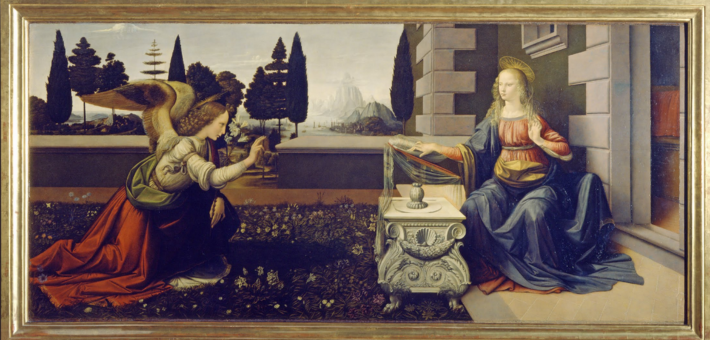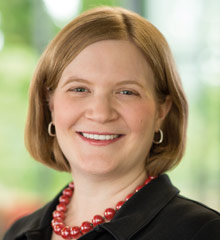Commentary on 2 Samuel 7:1-11, 16
At first glance, the lectionary’s juxtaposition of this text—God’s promise to David of a permanent dynastic kingdom—with Luke 1:26–38 might suggest it is only useful as a prooftext, in a supporting role to the Gospel writer’s assertions that Jesus will be given “the throne of his ancestor David” (Luke 1:32). Taken on its own, though, 2 Samuel 7 can be, among other things, an Advent call to look for hope outside of ourselves.
In our passage, following many years of a peripatetic existence and fresh off of his triumphant return of the ark of the covenant to Jerusalem (2 Samuel 6), David is enjoying an interlude of peace and is settled in his own house (2 Samuel 7:1). Perhaps feeling refreshed with time to reflect, David suddenly notices that he has a permanent home of cedar, while the ark of God has no such abode. The prophet Nathan endorses David’s decision to remedy this problem, only to be warned off the project by God in a vision that same night. Nathan reports this message from God to David.
At the center of God’s speech is a word-play on the Hebrew term bayit, “house.” Bayit has multiple meanings in common usage throughout the Old Testament. First is the most literal sense of house as “dwelling place”—a shelter, a home. Sometimes “house” refers both to the structure and metonymically to everyone in it, as when David returns to bless his “house” (in other words, household) after dancing in front of the ark in the previous chapter (2 Samuel 6:20).
A second, closely related meaning of bayit when used with reference to God is “temple,” or literally “house of God.” In the Old Testament the temple, like the tabernacle before it, is understood as a dwelling place for God—a place for God to remain in the midst of God’s people, and a place where the people can encounter God.
A third use of bayit is to refer to a familial lineage: a string of descendants associated with a single figure or family. We hear this usage carry over into Greek and then English in the familiar King James Version translations of Luke 2, which explains that Joseph “was of the house and lineage of David” (Luke 2:4b). In our 2 Samuel 7 passage, God tells David that God has done just fine without a settled house so far (verse 6); that God has never asked anyone, including and especially David, to build a house for him (verse 7); and that what’s more, God will build a house for David, not the other way around (verse 11).
Here is where the text gets especially punny. David’s “house” is not a physical house but a lineage, and God promises it will endure: first through David’s son Solomon, who will build God’s temple (verses 12–15), and then for the long term, with generations of Davidic descendants ruling Israel (verse 16).
All of God’s promises to David here are a check on David’s hubris, even as they are also a confirmation of David’s special status. Though David is acting out of an impulse of faithful piety, he has presumed to be the actor, the change-maker, the one preparing the future—even God’s own future. David hears from God that he is more than an individual with a successful résumé. Even though he may be credited as the father of this dynastic house, he is part of something bigger than himself. Notice all the first-person verbs employed in God’s speech in verses 6–11; God is the subject who has acted and will continue to act. David is the king, but he does not dictate the future. God is the subject of the verbs, while David is subject to the faithful actions of God.
This year, the Fourth Sunday of Advent is also Christmas Eve, meaning that stories of the birth of Jesus will follow closely on this reading, probably in a service on the very same day. Public spaces will have been piping out Christmas songs for weeks, songs that work hard to manufacture nostalgia for “home” for us, like “I’ll Be Home for Christmas” and “There’s No Place Like Home for the Holidays.” But 2 Samuel 7 could point us toward a different song for the season, one that prods us to think broadly about what “home” and “house” are: Psalm 23.
The closing lines of Psalm 23—a psalm traditionally associated with David, even if he may not be its actual author—echo this idea of rest as a gift from God. Instead of running away from enemies, the psalmist sits fearlessly at a banquet table that God has set in front of them; God is the actor, the provider of the feast (Psalm 23:5). Instead of being chased by those enemies, the psalmist is dogged by goodness and mercy, pursuers from which the psalmist need not run (Psalm 23:6). The psalmist finds rest in God’s house—the temple, perhaps, but implicit here also is the nuance of bayit that implies “household.” In other words, the psalmist finds hope through belonging to God: “Surely goodness and mercy will pursue me all the days of my life, and I will dwell in the house of the LORD for the length of my days” (Psalm 23:6, my translation).
The great 18th-century hymn writer Isaac Watts paraphrased Psalm 23 in the hymn “My Shepherd Will Supply My Need.” In its last stanza, Watts renders those final verses of Psalm 23 this way:
The sure provisions of my God
attend me all my days.
Oh, may your house be my abode,
and all my work be praise.
There would I find a settled rest,
while others go and come,
no more a stranger, nor a guest,
but like a child at home.
The exhaustion of pregnant Mary on her journey to Bethlehem, the busyness of the holiday season, the incessant work demands that often accompany the close of the calendar year, and the unrelenting violence that plagues our world: all of these realities beckon preachers to speak a word of hope for the “settled rest” that comes with belonging to God. Second Samuel 7 reminds us to seek hope outside of our own desires, capabilities, or nostalgia, and instead inside of the ongoing, faithful work of God.


December 24, 2023